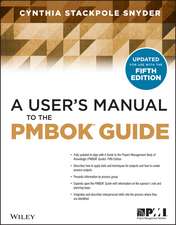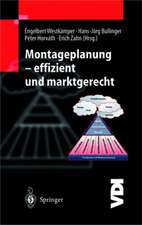Real-Time Management of Resource Allocation Systems: A Discrete Event Systems Approach: International Series in Operations Research & Management Science, cartea 79
Autor Spyros A. Reveliotisen Limba Engleză Hardback – dec 2004
Toate formatele și edițiile
| Toate formatele și edițiile | Preț | Express |
|---|---|---|
| Paperback (1) | 694.87 lei 6-8 săpt. | |
| Springer Us – 6 dec 2010 | 694.87 lei 6-8 săpt. | |
| Hardback (1) | 949.10 lei 6-8 săpt. | |
| Springer Us – dec 2004 | 949.10 lei 6-8 săpt. |
Din seria International Series in Operations Research & Management Science
- 20%
 Preț: 331.25 lei
Preț: 331.25 lei - 9%
 Preț: 696.06 lei
Preț: 696.06 lei - 20%
 Preț: 570.62 lei
Preț: 570.62 lei - 18%
 Preț: 1132.02 lei
Preț: 1132.02 lei - 18%
 Preț: 773.72 lei
Preț: 773.72 lei -
 Preț: 170.40 lei
Preț: 170.40 lei - 17%
 Preț: 459.35 lei
Preț: 459.35 lei - 17%
 Preț: 360.48 lei
Preț: 360.48 lei -
 Preț: 263.40 lei
Preț: 263.40 lei - 24%
 Preț: 905.31 lei
Preț: 905.31 lei - 17%
 Preț: 460.09 lei
Preț: 460.09 lei - 17%
 Preț: 459.35 lei
Preț: 459.35 lei - 20%
 Preț: 631.58 lei
Preț: 631.58 lei - 13%
 Preț: 480.01 lei
Preț: 480.01 lei - 18%
 Preț: 738.28 lei
Preț: 738.28 lei - 18%
 Preț: 1225.94 lei
Preț: 1225.94 lei - 18%
 Preț: 948.92 lei
Preț: 948.92 lei - 18%
 Preț: 703.88 lei
Preț: 703.88 lei - 18%
 Preț: 957.44 lei
Preț: 957.44 lei - 15%
 Preț: 651.84 lei
Preț: 651.84 lei - 20%
 Preț: 336.21 lei
Preț: 336.21 lei - 15%
 Preț: 641.03 lei
Preț: 641.03 lei -
 Preț: 404.29 lei
Preț: 404.29 lei - 18%
 Preț: 950.21 lei
Preț: 950.21 lei - 15%
 Preț: 649.06 lei
Preț: 649.06 lei - 18%
 Preț: 725.75 lei
Preț: 725.75 lei -
 Preț: 394.12 lei
Preț: 394.12 lei - 18%
 Preț: 951.47 lei
Preț: 951.47 lei - 15%
 Preț: 639.59 lei
Preț: 639.59 lei - 18%
 Preț: 773.06 lei
Preț: 773.06 lei - 18%
 Preț: 889.29 lei
Preț: 889.29 lei - 15%
 Preț: 655.60 lei
Preț: 655.60 lei - 15%
 Preț: 640.06 lei
Preț: 640.06 lei
Preț: 949.10 lei
Preț vechi: 1157.44 lei
-18% Nou
Puncte Express: 1424
Preț estimativ în valută:
181.60€ • 190.63$ • 150.74£
181.60€ • 190.63$ • 150.74£
Carte tipărită la comandă
Livrare economică 11-25 aprilie
Preluare comenzi: 021 569.72.76
Specificații
ISBN-13: 9780387239606
ISBN-10: 038723960X
Pagini: 242
Ilustrații: X, 244 p.
Dimensiuni: 155 x 235 x 19 mm
Greutate: 0.55 kg
Ediția:2005
Editura: Springer Us
Colecția Springer
Seria International Series in Operations Research & Management Science
Locul publicării:New York, NY, United States
ISBN-10: 038723960X
Pagini: 242
Ilustrații: X, 244 p.
Dimensiuni: 155 x 235 x 19 mm
Greutate: 0.55 kg
Ediția:2005
Editura: Springer Us
Colecția Springer
Seria International Series in Operations Research & Management Science
Locul publicării:New York, NY, United States
Public țintă
Professional/practitionerCuprins
Resource Allocation Systems: Concepts and Problems.- Logical Control of Disjunctive / Conjunctive Resource Allocation Systems.- Sequential RAS Admitting Optimal Nonblocking Supervision of Polynomial Complexity.- Polynomial-Kernel Nonblocking Supervisory Control Policies for Single-Unit RAS.- Logical Control of RAS with Complex Process Flows.- Performance-Oriented Modelling and Control of Logically Controlled RAS.- Epilogue.
Textul de pe ultima copertă
REAL-TIME MANAGEMENT OF RESOURCE ALLOCATION SYSTEMS focuses on the problem of managing the resource allocation taking place within the operational context of many contemporary technological applications, including flexibly automated production systems, automated railway and/or monorail transportation systems, electronic workflow management systems, and business transaction supporting systems. A distinct trait of all these applications is that they limit the role of the human element to remote high-level supervision, while placing the burden of the real-time monitoring and coordination of the ongoing activity upon a computerized control system. Hence, any applicable control paradigm must address not only the issues of throughput maximization, work-in-process inventory reduction, and delay and cost minimization, that have been the typical concerns for past studies on resource allocation, but it must also guarantee the operational correctness and the behavioral consistency of the underlying automated system. The resulting problem is rather novel for the developers of these systems, since, in the past, many of its facets were left to the jurisdiction of the present human intelligence. It is also complex, due to the high levels of choice – otherwise known as flexibility – inherent in the operation of these environments.
This book proposes a control paradigm that offers a comprehensive and integrated solution to, both, the behavioral / logical and the performance-oriented control problems underlying the management of the resource allocation taking place in the aforementioned highly automated technological applications. Building upon a series of fairly recent results from Discrete Event Systems theory, the proposed paradigm is distinguished by: (i) its robustness to the experienced stochasticities and operational contingencies; (ii) its scalability to the large-scale nature of the target technological applications; and (iii) itsoperational efficiency. These three properties are supported through the adoption of a "closed-loop" structure for the proposed control scheme, and also, through a pertinent decomposition of the overall control function to a logical and a performance-oriented controller for the underlying resource allocation. REAL-TIME MANAGEMENT OF RESOURCE ALLOCATION SYSTEMS provides a rigorous study of the control problems addressed by each of these two controllers, and of their integration to a unified control function. A notion of optimal control is formulated for each of these problems, but it turns out that the corresponding optimal policies are computationally intractable. Hence, a large part of the book is devoted to the development of effective and computationally efficient approximations for these optimal control policies, especially for those that correspond to the more novel logical control problem.
This book proposes a control paradigm that offers a comprehensive and integrated solution to, both, the behavioral / logical and the performance-oriented control problems underlying the management of the resource allocation taking place in the aforementioned highly automated technological applications. Building upon a series of fairly recent results from Discrete Event Systems theory, the proposed paradigm is distinguished by: (i) its robustness to the experienced stochasticities and operational contingencies; (ii) its scalability to the large-scale nature of the target technological applications; and (iii) itsoperational efficiency. These three properties are supported through the adoption of a "closed-loop" structure for the proposed control scheme, and also, through a pertinent decomposition of the overall control function to a logical and a performance-oriented controller for the underlying resource allocation. REAL-TIME MANAGEMENT OF RESOURCE ALLOCATION SYSTEMS provides a rigorous study of the control problems addressed by each of these two controllers, and of their integration to a unified control function. A notion of optimal control is formulated for each of these problems, but it turns out that the corresponding optimal policies are computationally intractable. Hence, a large part of the book is devoted to the development of effective and computationally efficient approximations for these optimal control policies, especially for those that correspond to the more novel logical control problem.
Caracteristici
Focuses on the problems of managing resource allocation in modern business settings, including flexibly automated production systems, automated railway and monorail transportation systems, electronic workflow management systems Emphasizes the operational correctness and behavioral consistency of automated systems supervised remotely by humans and operated by machines Solutions must not only typical savings criteria, but also the behavior of the underlying management system Outlines and explains these research developments and their implementation in a complete control framework Includes supplementary material: sn.pub/extras








